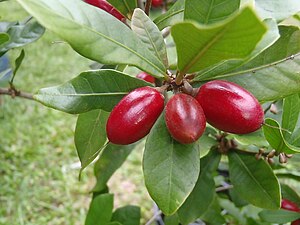Difference between revisions of "Synsepalum dulcificum"
(Created page with "{{taxobox | name = ''Synsepalum dulcificum'' | image = MiracleBerry.jpg | regnum = Plantae | unranked_divisio = Angiosperms | unranked_classis = Eudicots | unra...") |
(start article) |
||
| Line 28: | Line 28: | ||
}}</ref> | }}</ref> | ||
}} | }} | ||
| + | |||
| + | The '''miracle fruit''' (''Synsepalum dulcificum'') is remarkable not for its own flavor, which is unremarkable, but for the effect it has on the tongue, which transforms the flavors of other foods. Specifically, after the miraculin protein binds to the taste receptors, it makes sour foods taste sweet. You can bite into a slice of lime, or a cranberry, and it tastes delicious. | ||
==References== | ==References== | ||
| Line 35: | Line 37: | ||
[[Category:Sapotaceae]] | [[Category:Sapotaceae]] | ||
| − | [[Category:Plants | + | [[Category:Plants Keenan has eaten]] |
Latest revision as of 10:53, 28 October 2017
| Synsepalum dulcificum | |
|---|---|

| |
| Scientific classification | |
| Kingdom: | |
| (unranked): | |
| (unranked): | |
| (unranked): | |
| Order: | |
| Family: | |
| Genus: | |
| Species: | S. dulcificum
|
| Binomial name | |
| Synsepalum dulcificum | |
| Synonyms | |
|
Bakeriella dulcifica (Schumach. & Thonn.) Dubard | |
The miracle fruit (Synsepalum dulcificum) is remarkable not for its own flavor, which is unremarkable, but for the effect it has on the tongue, which transforms the flavors of other foods. Specifically, after the miraculin protein binds to the taste receptors, it makes sour foods taste sweet. You can bite into a slice of lime, or a cranberry, and it tastes delicious.
References
- ↑ "Synsepalum dulcificum (Schumach. & Thonn.) Daniell". African Flowering Plants Database. Conservatoire et Jardin Botaniques de la Ville Genève – South African Biodiversity Institute. Archived from the original on 2008-12-07. Retrieved 2008-08-11.
Acknowledgements
This article uses material from the Wikipedia article Synsepalum dulcificum, which is released under the Creative Commons Attribution-Share-Alike License 3.0.